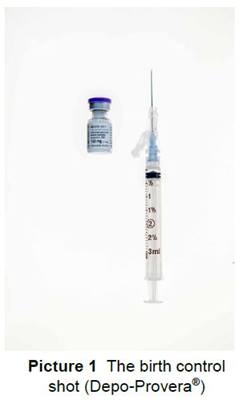Birth Control: The Shot (Depo-Provera®)

The birth control shot (Depo-Provera®) is given once every 11 to 13 weeks (Picture 1). The shot contains a small amount of progesterone that is like the hormones naturally made in the body. The shot prevents pregnancy by stopping the egg from being released from the ovary.

The birth control shot also changes mucus at the cervix. This keeps sperm from reaching an egg.
Advantages of the Shot
- More than 94% effective with typical use
- Lasts for 13 weeks at a time
- Lighter periods
- Periods may stop completely
- Lighter cramps
- May improve premenstrual syndrome (PMS)
- You can get the shot immediately after giving birth
- Safe with breastfeeding
Disadvantages of the Shot
- You must go to the clinic every 11 to13 weeks for the shot.
- You can get pregnant if you are late getting your shot or miss a shot.
- Possible side effects are weight gain and changes in your mood.
- Your periods will not be regular. In some rare cases, there may be more days of bleeding than before the shot.
- Some people may have a delay in getting pregnant after stopping the shot.
Risks
Decreased bone density: The shot may cause a drop in bone mineral density. The risk is highest for people less than 20 years of age. There is no proof that this causes broken bones. Young people using the shot should eat 3 servings of calcium-rich foods daily. This can include milk, yogurt, cheese, almonds, and leafy greens.
Who Cannot Get It
Do not use the birth control shot if you have:
- Unexplained vaginal bleeding not discussed with a health care provider.
- A history of a stroke.
- Diabetes with complications.
- Lupus with antiphospholipid antibodies.
Tell your health care provider if you have any of these risk factors or conditions, or any other medical concerns.
When to Call the Health Care Provider
Call the health care provider right away if you:
- Think you are pregnant.
- Think you might have a sexually transmitted infection (STI).
- Are depressed or have a change in mood after starting the shot.
Preventing STIs
The birth control shot does not protect against STIs. Condoms are the best way for sexually active people to reduce the risk of infection. Always use a condom when you have sex. Get yearly health check-ups, including testing for STIs.
HH-IV-65 8/93 Revised 3/22 Copyright 1993, Nationwide Children’s Hospital
